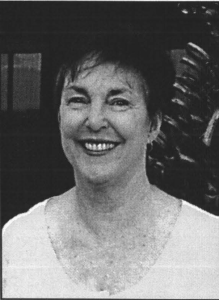Jeanne Branch Johnston

Tsunamis Remembered: Oral Histories of Survivors and Observers in Hawai‘i
Life history interviews with individuals who witnessed and survived tsunamis-particularly the 1946 and 1960 disasters on the Big Island of Hawai'i. Thirty individuals-mostly residents of Hilo and Laupahoehoe-recall their experiences before; during, and after the 1946 and 1960 tsunamis which were arguably the most destructive natural disasters in modem Hawaiian history.
The oldest of two children born to Willard Hogle Branch and Elizabeth Mason Branch, Jeanne Branch Johnston was born in Hilo on December 2, 1939. Johnston's maternal grandfather, Charles William Mason, was the inventor of Canec, a fiberboard made from sugarcane bagasse. Mason became the superintendent of Hawaiian Cane Products Company, Ltd., located in Hilo near the site of the Waiakea Mill Company. After spending her early childhood in Hilo, Honolulu, Midway Island, and California, Johnston and her mother returned to Hilo in 1944. They lived in the Keaukaha district with her mother's parents. Three years later, Johnston moved to Honolulu, where she attended Lincoln School. She graduated from Punahou School in 1957. The mother of two grown children, Johnston is an O'ahu resident. Interviewed in her home, Johnston offered her perspective as a six-year-old child experiencing and witnessing the devastation of the 1946 tsunami in Keaukaha. It was this experience which inspired her involvement with the Pacific Tsunami Museum in downtown Hilo.
Scope and Content Note
A Hilo-born woman remembers her grandparents and their Keaukaha home. Only six years old when the 1946 tsunami hit, she tells of family members' escape and the post-tsunami destruction.
Program Note:
This interview is part of the Center for Oral History's project Tsunamis Remembered: Oral Histories of Survivors and Observers in Hawai‘i. Interviews from this project are available in the Center's ScholarSpace open access repository.
The Center for Oral History (COH), in the Department of Ethnic Studies at the University of Hawaiʻi at Mānoa, collects, documents, preserves and highlights the recollections of Native Hawaiians and the multi-ethnic people of Hawaiʻi. It produces oral histories and interpretive historical materials about lifeways, key historic events, social movements and Hawaiʻi’s role in the globalizing world, for the widest possible use.
Please Note: The oral histories in this collection are protected by copyright and have been created for educational, research and personal use as described by the Fair Use Doctrine in the U.S. Copyright law. Please reach out Voices@noaa.gov to let us know how these interviews are being used in your research, project, exhibit, etc. The Voices staff can help provide other useful resources related to your inquiry.
The NOAA mission is to understand and predict changes in climate, weather, oceans, and coasts, to share that knowledge and information with others, and to conserve and manage coastal and marine ecosystems and resources. The Voices Oral History Archives offers public access to a wide range of accounts, including historical materials that are products of their particular times, and may contain offensive language or negative stereotypes.
Voices Oral History Archives does not verify the accuracy of materials submitted to us. The opinions expressed in the interviews are those of the interviewee only. The interviews here have been made available to the public only after the interviewer has confirmed that they have obtained consent.
